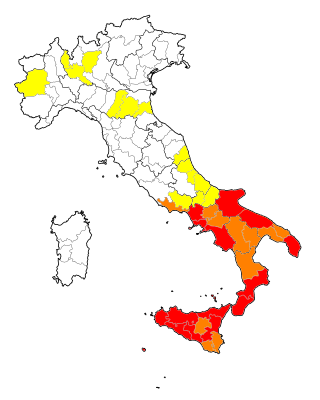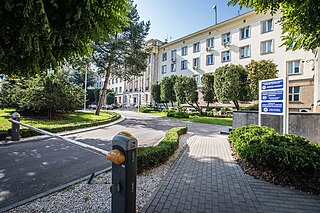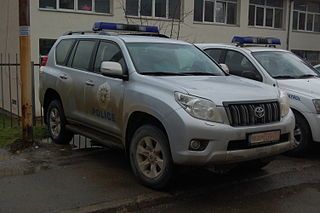The 'Ndrangheta is an Italian Mafia-type association based in the peninsular region of Calabria and dating back to the 19th century. Although loosely structured, it is considered one of the most powerful organized crime groups in the world. It is characterized by a horizontal structure made up of autonomous clans known as 'ndrine, based almost exclusively on blood ties. Since the 1950s, following wide-scale emigration from Calabria, 'Ndrangheta clans dispersed to other European countries, Australia and the Americas. Currently, its main activity is drug trafficking, but it also deals with human trafficking, sex trafficking, arms trafficking, money laundering, racketeering, extortion, and loan sharking.

The illegal drug trade, drug trafficking, or narcotrafficking is a global black market dedicated to the cultivation, manufacture, distribution and sale of prohibited drugs. Most jurisdictions prohibit trade, except under license, of many types of drugs through the use of drug prohibition laws. The think tank Global Financial Integrity's Transnational Crime and the Developing World report estimates the size of the global illicit drug market between US$426 and US$652 billion in 2014 alone. With a world GDP of US$78 trillion in the same year, the illegal drug trade may be estimated as nearly 1% of total global trade. Consumption of illegal drugs is widespread globally, and it remains very difficult for local authorities to reduce the rates of drug consumption.

Estonia is a relatively safe country, and the risk of being a victim of crime in Estonia is small by international standards. As in other post-Soviet states, crime has increased in the 1990s, but then it has gradually decreased in the 21st century.

Criminal organizations have been prevalent in Italy, especially in the southern part of the country, for centuries and have affected the social and economic life of many Italian regions since at least the 19th century. There are six major native mafia-like organizations that are heavily active in Italy. The most powerful of these organizations, the 'Ndrangheta from Calabria, then the Cosa Nostra from Sicily, and the Camorra based in Campania. In addition to these three long-established organizations, there are also three other significantly active organized crime syndicates in Italy that were founded in the 20th century: the Stidda of Sicily and the Sacra Corona Unita and Società foggiana, both from Apulia.

Crime is one of the most urgent concerns facing Mexico, as Mexican drug trafficking rings play a major role in the flow of cocaine, methamphetamine, fentanyl, heroin, and marijuana transiting between Latin America and the United States. Drug trafficking has led to corruption, which has had a deleterious effect on Mexico's Federal Representative Republic. Drug trafficking and organized crime have been a major source of violent crime. Drug cartels and gangs have also branched out to conduct alternative illegal activities for profit, including sex trafficking in Mexico. Some of the most increasingly violent states in Mexico in 2020 included Guanajuato, Zacatecas, Michoacán, Jalisco, and Querétaro. Some of the world's most violent cities are reportedly within the state of Guanajuato with extortion from criminal groups now being commonplace. The state of Zacatecas is said to be valuable to multiple organized crime groups for drug trafficking, specifically methamphetamine to the United States. As of 2021, Michoacán is experiencing increased instances of extortion and kidnapping due to a growing presence and escalation in the armed conflicts between CJNG and Cárteles Unidos on regions bordering the neighboring state of Jalisco. CJNG is also currently battling the Los Chapitos faction of the Sinaloa Cartel in the North Mexican region of Sonora.
Albanian mafia or Albanian organized crime are the general terms used for criminal organizations based in Albania or composed of ethnic Albanians. Albanian organized crime is active in Europe, North America, South America, and various other parts of the world including the Middle East and Asia. The Albanian Mafia participates in a diverse range of criminal enterprises including trafficking in drugs, arms, and humans. Thanks to their close ties with the 'Ndrangheta of Calabria, they control a large part of the billion dollar wholesale cocaine market in Europe and appear to be the primary distributors of cocaine in various European drug hubs including London. Albanian organized crime is characterized by diversified criminal enterprises which, in their complexity, demonstrate a very high criminal capacity. In Albania, there are over 15 mafia families that control organized crime. According to some sources, Albania is the first European narco state.
Organised crime in Nigeria includes activities by fraudsters, bandits, drug traffickers and racketeers, which have spread across Western Africa. Nigerian criminal gangs rose to prominence in the 1980s, owing much to the globalisation of the world's economies and the high level of lawlessness and corruption in the country.
Gangs in Canada are mostly present in the major urban areas of Canada, although their activities are not confined to large cities.

Crime and violence affect the lives of millions of people in Latin America. Some consider social inequality to be a major contributing factor to levels of violence in Latin America, where the state fails to prevent crime and organized crime takes over State control in areas where the State is unable to assist the society such as in impoverished communities. In the years following the transitions from authoritarianism to democracy, crime and violence have become major problems in Latin America. The region experienced more than 2.5 million murders between 2000 and 2017. Several studies indicated the existence of an epidemic in the region; the Pan American Health Organization called violence in Latin America "the social pandemic of the 20th century." Apart from the direct human cost, the rise in crime and violence has imposed significant social costs and has made much more difficult the processes of economic and social development, democratic consolidation and regional integration in the Americas.

Crime in Poland refers to the incidence, deterrence, and handling of criminal activity in the Republic of Poland by Polish law enforcement agencies charged with ensuring public safety and maintaining order. Poland ranks favorably in terms of public safety, with one of the lowest homicide rates in Europe. Poland was ranked 25th in the 2022 Global Peace Index and scored 0.0 on the 2023 Global Terrorism Index.
The Montenegrin mafia refers to the various criminal organizations based in Montenegro or composed of Montenegrins. Outside of the country Montenegrin gangs are active throughout Europe-notably Serbia. The gangs tend to specialize in narcotics smuggling, tobacco smuggling and arms trafficking.
The Bosnian mafia is the body of illegal gangs and criminal organisations operating in Bosnia and Herzegovina and within the Bosnian diaspora. Bosnian organised crime figures operate mostly in Europe. Bosnian organised-crime groups are involved in a wide range of activities and extortion. Smuggling revenues are between €600 million and €900 million.

Kosovo within communist Yugoslavia had the lowest rate of crime in the whole country. Following the Kosovo War (1999), the region had become a significant center of organized crime, drug trafficking, human trafficking and organ theft. There is also an ongoing ethnic conflict between Kosovar Albanians and Kosovan Serbs. The large Kosovar diaspora which had built up in Western Europe during the 1990s, combined with the political instability, created ideal conditions for Kosovo to become "Europe's crime hub"; well into the 2000s, Kosovo remained associated with both ethnic conflict and organized crime. A Kosovo Police service has been built up under UN administration, beginning in 1999. It had an operational force of 7,000 officers in 2004, and further expanded to 9,000 by 2010. The deplorable crime rate led to an additional deployment of civilian law enforcement resources of the European Union to Kosovo, under the name of European Union Rule of Law Mission in Kosovo in 2008. Originally scheduled for two years, the duration of the deployment was extended twice, as of September 2012 scheduled to last until 2014.

Crime in Germany is handled by the German police forces and other agencies.
The Romanian mafia or Romanian organized crime is the category of organized crime groups whose members are citizens of Romania or living abroad in the Romanian diaspora. In recent years they have expanded their criminal activities in the European Union, reads a Europol report on EU organized crime, being active mostly in Italy, Spain and the United Kingdom. The Romanian Mafia is composed of several major organized groups, which in turn have wider networks throughout Europe and have even reached as far as North and Central America.
Organized crime in the Netherlands, sometimes called penose is the organised criminal underbelly in Amsterdam and other major cities. Penose usually means the organizations formed by criminals of Dutch descent. It is a slang word coming from the old Amsterdam Bargoens language.
Although organized crime has always existed in Sweden, it has risen significantly in the 2000s. The number of organized criminal groups operating in the country continues to rise. In 2018, Sweden had the highest gun deaths in total across Europe, and deaths involving guns tripled in Sweden between 2012 and 2020.
British firms are organised crime groups originating in the United Kingdom.
Cape Verdean organized crime refers to the various criminal organizations that are active in Cape Verde & Cape Verdean diaspora communities. Cape Verde is important as a transshipment point in the cocaine trade, and the existence of sizeable Cape Verdean communities in New England, the Dutch port city of Rotterdam as well as in several cities in Portugal, France and Switzerland, led to the formation of criminal gangs in the community active in the international drug trade supplemented with other criminal activities. Cape Verdean organized crime primarily comes in the form of street gangs, with varying levels of organization and sophistication.
Maritime drug smuggling into Australia refers to the smuggling of illicit drugs into Australia by sea. While much contemporary Australian media coverage has focused on smaller, more personalised smuggling cases such as the Bali Nine, maritime drug smuggling often allows criminal groups to move illicit drugs and substances into Australia at a much greater scale. This has happened through a variety of ways, including via cargo ship, yacht, and fishing vessels. Key departure locations for drugs aimed to be smuggled into Australia include China, India, Southeast Asia, and the Americas, with much of the drugs trafficked via countries and territories in the South Pacific, in close proximity to Australia.









